Niamh Algar talks to John Byrne about her latest film role, playing fictional 1980s' film censor Edith Baines in British horror film Censor.
Over the last 12 months I’ve probably seen more of Niamh Algar than most of her family. Between watching her on TV, film and sharing one-to-one interviews with her for RTE Entertainment, we’ve clocked-up quite a lot of time shared. And each time I see her, I become even more impressed.
Here’s a woman who’s clearly dedicated to her craft. And she’s only 29, so there’s a hell of a lot more to come. She’s just a joy to watch. And the diversity of her roles is what truly marks her out as a singular talent.
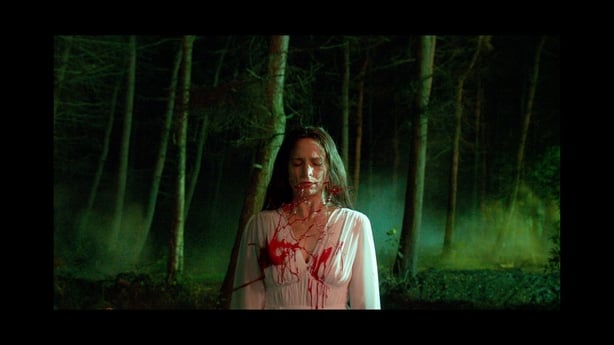
If you’re currently watching Deceit on Channel 4, Censor offers an ideal opportunity to experience just some of the range she’s already displayed. In the former, she’s a tough undercover cop. Someone who can take on life-threatening tasks and a beating with a pinch of salt. It’s her job to risk her life, almost on a daily basis.
Here, she plays a vastly different character. Enid Baines, a film censor; a diligent, desk-bound public servant. Someone whose 9-5 revolves around watching movies for a living. Even I could do that.
Enid is an apparently placid type, quietly going about the business of removing the nastier snippets of cinema in the public interest. But internally, she’s struggling with the loss of her disappeared sister.
One day a slasher film called Don’t Go To The Church arrives at her in tray, and it revives explicit memories of her sister, and so she seeks out the director. Then things really kick off . . .
In the spirit of the films that inspired it, Censor is a low-budget indie, but it is quite an impressive debut from director and co-writer Prano Bailey-Bond, someone’s who future looks as upward-bound as Niamh Algar’s.
Technically, the film’s highlight is the way the director flawlessly flicks between various horror film styles and formats to bring the viewer into Enid’s world. Your average movie buff will relish the task of pointing out her influences.
But you don’t have to be a fan of the slasher genre to enjoy this film, as it’s more a psychological drama - think, Robert Wise’s 1963 classic The Haunting - than a mere gore-fest.
Linking up with Niamh Algar by Zoom, there's a couple of false starts to our chat as the internet connection is rather fuzzy from my end. Such are the ways on interviewing during these pandemic times.
But once we get into the swing of things, Niamh’s laid-back manner, sense of humour and candid responses ensure that the conversation flows.
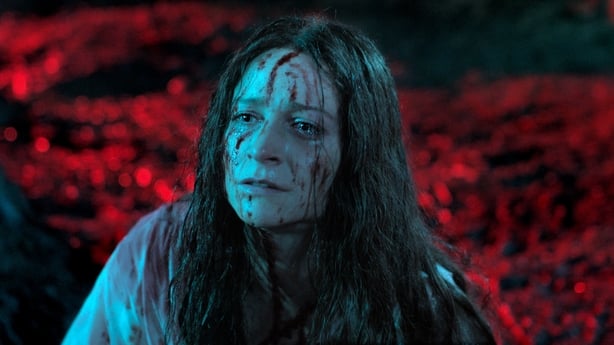
John Byrne: We’ve seen you in such a vast array of roles over the last few years. You’re certainly not someone who’s going to be pigeon-holed to play a certain type of character. I presume that’s deliberate?
Niamh Algar: That’s the plan. Keep 'em guessing, John. Never do the same character twice.
It’s the 1980s, the era of the slasher movie and your character is - ironically - slashing bits out of slasher movies. But there’s more to her than that. Tell us about her . . .
I play Enid Baines. She’s a film censor and it’s her job to cut explicit content for the audience. She ultimately has this repressed memory, this childhood trauma she’s pushed down.
And she sees this film called Don’t Go In The Church that has a very profound effect on her, and kind of causes this memory or this trauma begin to resurface, and she can’t help but ignore that, and goes on this quest to discover what actually happened to her sister.
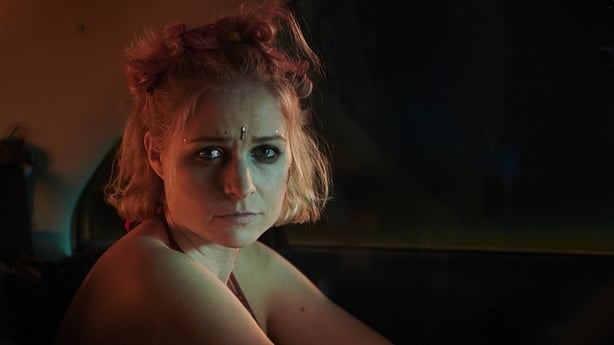
It is a psychological drama set within a horror. And what was so appealing to me with this character was the idea of this psychological journey that this character goes on, from where we see Enid at the start.
She’s incredibly buttoned up and held together person, to this tortured, unraveled soul by the end. It’s an actor’s dream to just explore that and present that to an audience, and present something that we haven’t seen portrayed before.
Enid goes on some journey. She starts off with a poker up her arse and ends up with a hatchet in her hand.
That’s one way of putting it!
And you play her in virtually every scene of the film - was that a burden, a challenge, or what?
That was such a joy - to be able to stay in that space . . .
In other productions, where you could be working for one week, and then not come to the character until three weeks later, because it is such a psychologically demanding role, to be able to just stay in that in the ten weeks [of filming] and stay with that character was really rewarding.
And just to research that role. I enjoy the research just as much as the shooting.
So much of what Enid is going through is in her head and she’s not vocalising what she’s feeling. And with an audience, you have to read into every thing between the lines.
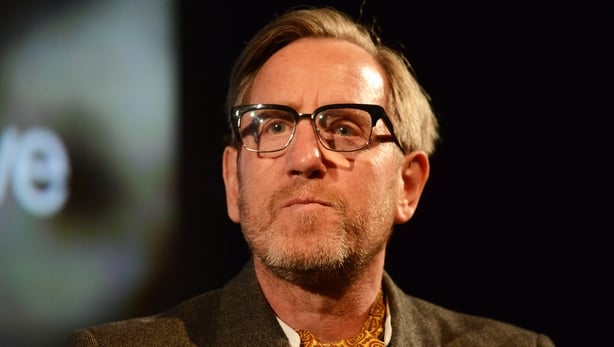
You’ve got the great Michael Smiley popping up now and again, playing a film producer. What was it like working with him?
He’s such a joy. Michael is hilarious. You know he ad libs coming in and out of a scene, and he has so many stories on-set, he’s just a bundle of entertainment.
But yet he’s giving as an actor. So committed and present.
And the film is the work of a first-time director, Prano Bailey-Bond. You guys actually have a bit of history I believe?
Yeah. We were both named as Screen International’s Stars of Tomorrow back in 2018. So we met at the dinner, over a creme brullee (laughs). Then this script came in and I saw her name at the top.
So I felt like I’d already broken the ice coming into the casting, because I’d kind of got sense of her as a person.
She’s such a lovely human being, and so talented that I’m so excited to see what she does next. She’s already started prepping her next project, she’s working with the producers of Call Me By Your Name. She’s going to go stratospheric.
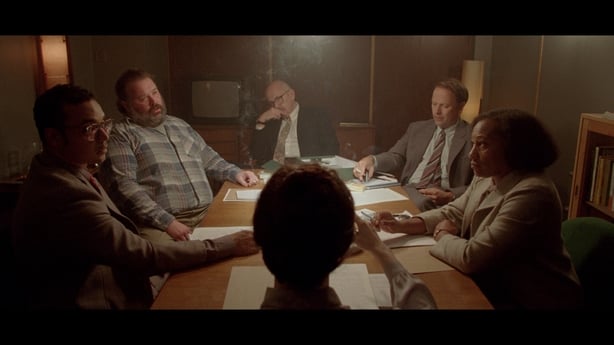
80s’ Slasher movies - are you familiar with the genre at all?
No. I wasn’t aware of it. It was before my time, to begin with, but the term ‘Video Nasties’ was a term I’d heard thrown around, but I hadn’t really understood what it meant. And so this was an education for me into the whole genre.
This, of course, was a time when concerned parents thought that listening to certain music or watching films like slasher movies would turn their kids crazy . . .
And people had that opinion about video games. If the kids are constantly playing games that contain guns and violence - but there’s no study to back that up. It’s interesting.
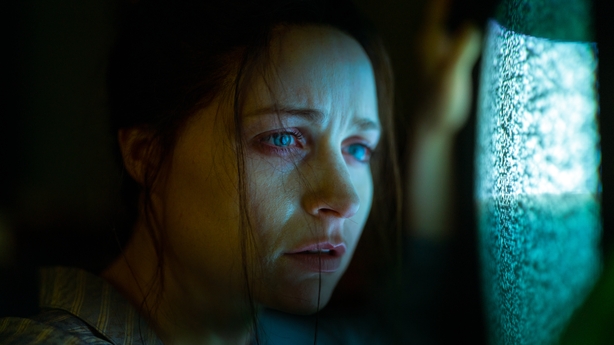
There’s an assumption that people can’t tell the difference between reality and make-believe . . .
Yeah. And I think what this film does is it blurs those lines and Enid herself can’t decipher between the reality and the fiction of the story that’s going on within her own head.
And I love how [director] Prano [Bailey-Bond] has kind of encapsulated that through the style of her film, and the way in which the formatting changes. And even visually, it changes, and it’s a film that I can’t wait to see.
I’ve only seen it on my laptop because I’ve been away and cinemas haven’t been open.
We’re going to get the cast and crew together and watch it on a big screen. And that’s going to be so refreshing, because it’s a film that needs to be watched on a big screen.
Censor is on general release from August 20


